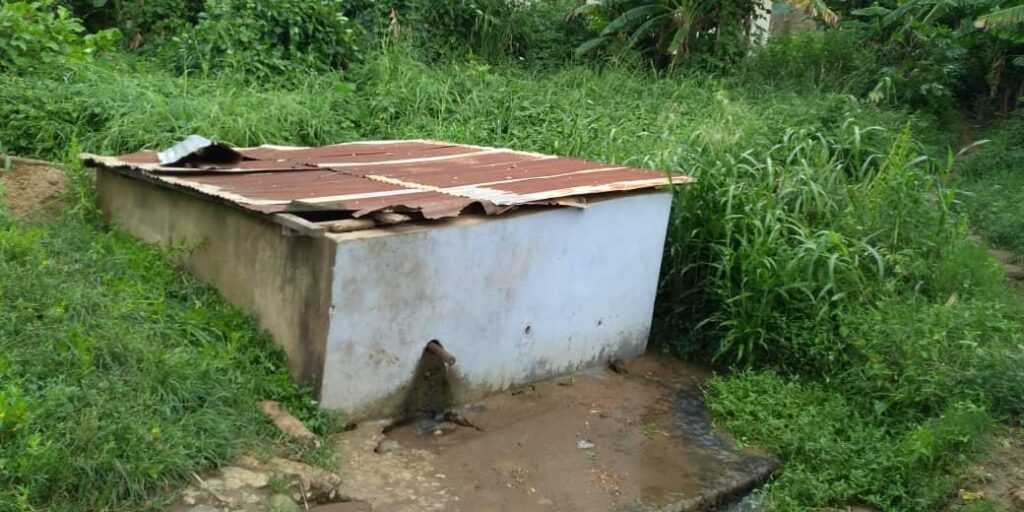Water, as the saying goes, is life and no one can survive very long without it. One can live up to a month without food, but one can only survive for up to a week without water.
Despite the essence of water to life, pupils of Ada Kyerematen Basic School in the New Juaben South Municipality of the Eastern Region do not have access to potable water to drink and wash their hands.
Hand washing hygiene has become critical for reducing Covid-19 figures along with the other safety protocols outlined by the Ghana Health Service (GHS).
In the absence of potable water in the school, pupils resort to using the untreated and contaminated stream water source known as the Awaiasu Stream since basic schools reopened in January this year.
The Ada Kyerematen Basic School has a total enrollment of 500 pupils operating under Section A and B.

Every morning with buckets in hand, females and males rotate to fill the Veronica Buckets mounted at vantage points on the school compound with the untreated stream to ensure they observe the hand washing hygiene protocol.
Unfortunately, the debris from the untreated stream is visible when the almost brownish water settles.
These school children busily wash their hands ignorant of the repercussions on their health. They spend an average of seven hours daily in school and they have no choice than to use it to wash their hands and drink as well when they are thirsty and have no money to buy sachet water.
A visit to the school met the headmistress of the Section A department, but she would not officially speak to me for fear that her superiors from the New Juaben South Education Office would query her.
Knowing the water problem of the school, she carries her own small bucket filled with potable water to school daily to wash her hands.
The United Nations Convention of the Rights of the Child Act in Section 24 states that children have the right to best healthcare possible, clean water to drink , healthy food and a clean and safe environment to live in.
Beyond the vulnerable basic school pupils whose ages are between four and 18, the entire 2000 residents of the Ada Kyerematen community also use the same untreated stream for their domestic daily usage.
The insanitary conditions of the community worsens the poor state of the Awiasu’s Stream and some leaked wash room facilities flows into the Awiasu stream source, rendering it more unsafe and its protective covering irrelevant.
As if plagued by access to water, their old bore holes stopped functioning years ago, affecting the increasing population demand for potable water.
A resident of the community, Kwame Owusu, said: “We use this water for washing and sometimes drink it, but it smells bad in recent times. Government and the responsible authorities must provide us with a potable water facility urgently”.

Krontihene of the Ada Kyerematen community Nana Kyerematen Frempong Manso expressed his worry for the pupils as they are exposed to an outbreak of a water borne disease, saying, “our water is no more hygienic, we need potable water”.
He noted that several reports have been made to the New Juaben South Municipal Assembly to provide them with potable water, but they are yet to see any of the promises materialise.
The Ada Kyerematen Community has a small population of 2,000 with the people engaged in buying and selling, and farming.
Females dominate the population.
Ada Kyerematen, hitherto, was noted to be an enviable community to which residents of Koforidua and its environs walk for their water needs. This was decades back when perennial water was prominent.
Dr Hectoria Awekeya of the Faculty of Public Health, Ghana College of Physician and Surgeons, pointed out the poor water quality cannot be effective for hand hygiene practice as enshrined in the Covid-19 protocols.
“This water the pupils are using is bad, the colour is almost brown, and when it settles you see unwanted particles in there. We can’t be using this to fight Covid-19 in basic schools.”
She expressed the worry that the pupils and residents of the community were also exposed to diarrheal, chronic infection and acute ailments.
“The assessment we have done shows that the water is of poor quality and not suitable for human consumption. The pupils and the community need access to clean water.”
The Sustainable Development Goal (SDG) Six enjoins countries to ensure that citizens have clean and affordable water, sanitation by 2030. This is essential for unlocking the economic growth, productivity and provides significant leverage for existing investments in health and education.
According to the Ghana Multiple Indicator Cluster Survey for 2017 and 2018, national access to basic drinking water stood at 79 percent, basic sanitation 21percent and 48 percent for basic hygiene.
For the Eastern Region, access to basic water was 78 percent, basic sanitation 30 percent, whiles basic hygiene was 65 percent.
The report further explained that 8.9 percent of the Eastern Region’s population use surface water as their drinking source, 2.5 percent use unprotected spring, 2.8 percent use unprotected well, whiles 26.2 percent use sachet water as their main source of drinking water.
The Goal is to ensure countries that signed on provide safe and affordable drinking water to all its citizenry.
Municipal Chief Executive of New Juaben South Municipal Assembly Isaac Apau Gyasi, has promised a bore hole for them but he is unable to tell when the project would take off.
“I have ordered the Assembly Engineer and Contractor to move to the area, someone wants to construct a bore hole for a community in need of potable water and we think it’s appropriate we construct it for Ada Kyerematen Community.”
He said discussions were underway with the Eastern Regional Ghana Water Company Limited for alternative lasting solutions.
By Yvonne Neequaye
The writer is a mentee under the JHR/GJA Mentorship Programme


